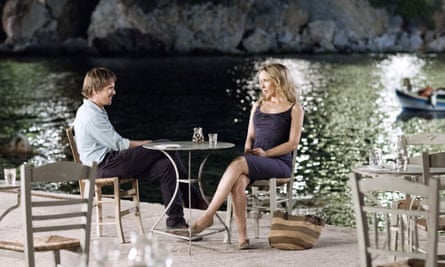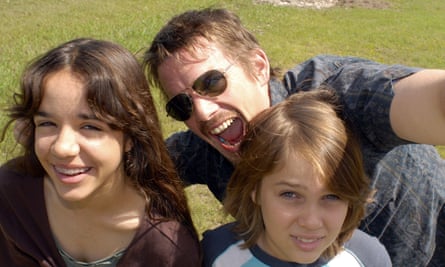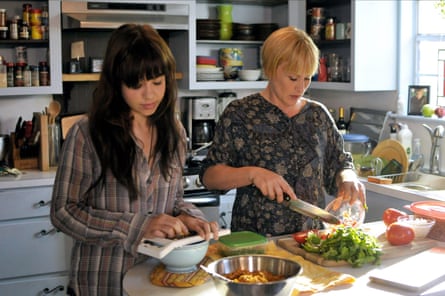The years run like rabbits in Richard Linklater’s Boyhood, that heart-piercing account of a kid growing up, and they continue to sprint after the closing credits have rolled. Production began in 2002. The last scenes were shot in summer 2013. Since then, we have grown older while the film has stayed the same. “I haven’t talked about Boyhood in years,” Linklater says, laughing, as if he is recalling an old high-school buddy or the one who got away.
Now, Boyhood is back in the form of a commemorative Blu-ray, nine years after its theatrical release. It’s good to see it returned and enshrined, although I prefer to imagine it’s still out there somewhere, living and breathing and remaking itself on screen. The director describes it as a life project, a time sculpture – weathered by the years and showing how people change. It’s strange, he admits, that the characters in his movie aren’t changing any more.
For anyone who missed Boyhood the first time around, Linklater’s picture is a time-lapse family story. The cast and crew gathered for a few days of shooting each summer. Its secret weapon is the young Ellar Coltrane, whose character, Mason, we see moving from kindergarten to college, but the picture has other strings to its bow. Ethan Hawke co-stars as the free-spirited dad who eventually straightens up and settles down. Patricia Arquette won an Oscar, a Screen Actors Guild award, a Bafta and a Golden Globe for her role as Mason’s struggling single mum, Olivia. Boyhood is a film about people. It’s about the world we inhabit. In its intimate fashion, it covers pretty much everything.
“I always described it as a film about growing up,” Linklater says now. “But it’s also a film about parenting. It’s about figuring your life out as a kid and figuring out how to parent. As kids, you think that your parents are fixed entities. Then you get there yourself and think: oh shit, I’m making this up as I go along.” He could easily have called it Parenthood, he adds, were it not for the fact that the title had already been taken.
Boyhood similarly made itself up on the fly. By its nature, it was a work in progress, a leap of faith, pieced together in collaboration with the actors and catching a changing US at the edge of the frame. No one was 100% certain that the project would last. There were too many random elements to contend with. But each year Linklater shot just a couple more scenes and watched his series of shorts become a full-grown feature.
“I’d tell everyone: ‘Look, it’s going to be fun to meet up every year.’ And I think that was mostly true. But the first five years were a slog. Everyone was so busy. Year two was the hardest. Patricia had a baby. Ethan was busy. I went off to do School of Rock and Before Sunset – two films back to back. And the finish line was still so far away. But it’s interesting, because then you turn a corner and the momentum starts building. I started to think that the kids were the analogy. Because as you get older you empower yourself. You get more freedom. Life gets better. And the film was like that, too – it became that bit more fun with every passing year.”
He used to joke that if he dropped dead, Hawke would have to step in and complete the picture. In the event, the one person who almost bailed out was the director’s daughter, Lorelei, who co-starred as Mason’s sister. It was an understandable wobble; he doesn’t blame her at all. “That little extrovert kid who you see singing and dancing in the early scenes? Well, suddenly she hits puberty and everything changes. So one day she asked me: ‘Can you kill me off?’ Like an actor leaving a TV soap. ‘It’ll be a memorable episode and then I’ll be off the show.’ And I had to tell her: ‘No, that’s a little too dramatic for what I have in mind.’” He thinks that, with hindsight, she is glad she stuck it out.
Boyhood, as Linklater puts it, is about growing up and being a parent. Relatedly, it’s also about responsibility and compromise, conflict and love. But at its core – in its essence – it is a film about time. The director wanted to make a coming-of-age tale that slipped the constraints of the typical shooting schedule; one that didn’t resort to flashbacks or lookalikes and instead showed the years slipping through our fingers like sand. He says that he was very aware of the emotional charge of each cut; the visual leap from Mason aged six to seven, eight and nine. How beautiful that would look. How remorseless, too.

This remains an abiding fascination, Linklater admits. He likes to view his career as a kind of art project; his personal time sculpture. After all, time was the uncredited star of Linklater’s Before trilogy, which visited Hawke and Julie Delpy’s lovers at nine-year intervals, catching them in Vienna (in 1995’s Before Sunrise), Paris (2004’s Before Sunset) and the Pelepponese (2013’s Before Midnight). I assume this romance has run its course, but never say never; the door is still ajar. “Well, it’s a trilogy for now,” says the director. “But the good thing there is that it’s after midnight: it’s a new day again and who knows how life unfolds. The three of us are still active. Anything can happen.”
He is working on an adaptation of Merrily We Roll Along, the Stephen Sondheim musical, with Paul Mescal in the role of a successful composer. But don’t hold your breath – it won’t be here for a while. Boyhood covered 12 years; Merrily tackles 20. If that weren’t enough, the plot plays out in reverse, chasing its hero from fat-cat middle-age all the way to his youth. Linklater is 62; he knows the clock is ticking. “I’m tempting fate, because I’m that much older than when I started Boyhood. I’m going to be in my 80s by the time this one’s done.”

It’s funny, he says. He doesn’t necessarily think he has any problem with closure; it’s more that some projects require a different level of commitment. Boyhood remains the obvious case in point. It began to feel like a constant when obviously it was finite, just like every other relationship in our lives.
“It was weird when it finished, when the next year rolled around and we weren’t shooting that summer,” he says. “When there was no longer the phone call to discuss what we’d do. It took probably four years to get used to that. It’s like when your parent passes away. You think: ‘Oh, I’m gonna call Mom,’ and then you think: ‘Oh wait, no, I can’t.’ People do that for years before it drifts out of their consciousness, and the ending of Boyhood was the same way for me. It was a major adjustment. It felt like a loss.”

